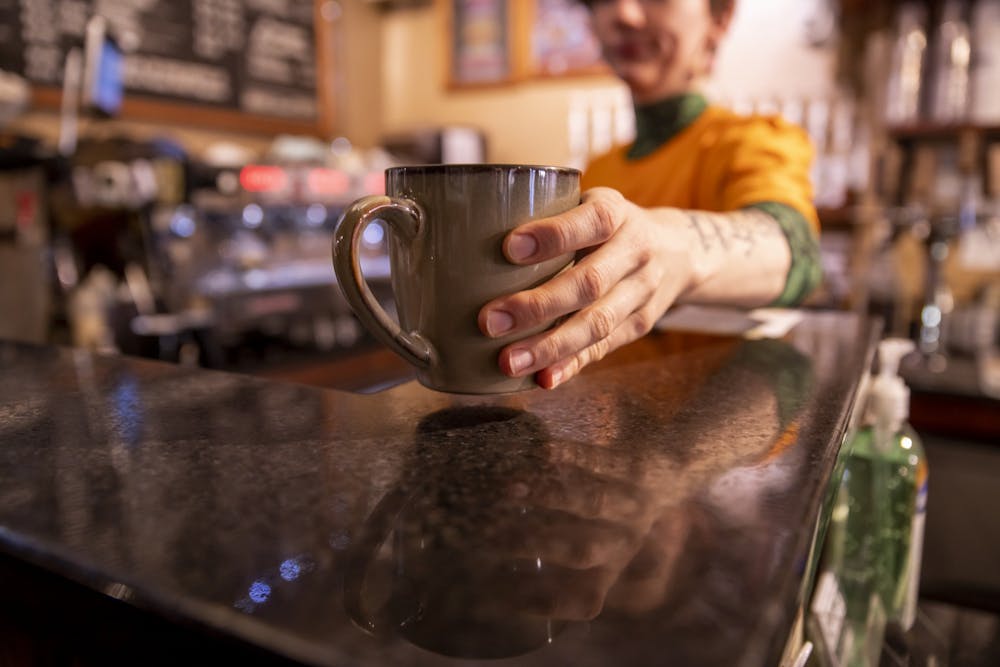Plastic items pollute oceans, killing and contaminating wildlife and littering the coasts. Many local restaurants and shops in Athens are fed up with plastic and are taking part in the fight against it.
Local Mexican restaurant Casa Nueva, 6 W. State St., has taken many steps to reduce as much plastic as they can. They no longer offer plastic to-go bags and now only use paper bags. However, they can’t avoid plastic bags altogether, as many manufacturers package their supplies in plastic.
“In some ways, it's unavoidable,” Grace Corbin, marketing director at Casa Nueva, said. “A lot of the supplies that we get come in a box and then in the boxes are plastic sleeves and plastic lids.”
Despite the inconvenience on the suppliers' part, this doesn’t stop Casa Nueva from finding ways to avoid the landfills. All of their plastic chip bags go to the local art studio for adults with developmental disabilities, Passion Works, where they use the plastic bags to stuff huge puppets.
“It’s still plastic being manufactured, but it’s not ending up killing fish,” Corbin said.
Casa Nueva has recently started and plans to continue sourcing to-go containers and straws that are compostable. Many compostable items don’t properly get disposed of, but with the Athens-Hocking Recycling Center picking up their compost, compostable straws and containers are a success.
Some Athens coffee shops like Court Street Coffee, 67 S Court St., and Donkey Coffee and Espresso, 17 W Washington St., have reduced their plastic intake as well.
Court Street Coffee has been working to counter the effects of plastic for a while now, jumping on the sip-lid train as soon as it became available to them a year ago. They also offer a 10 cent discount to customers who bring in their own mug and a 25 cent discount for those who purchase Court Street Coffee’s reusable drink wear.
Charlie Fulks, manger at Court Street Coffee, also encourages customers who don’t already have a reusable mug or don’t want to buy one to bring back their cup of coffee instead of throwing it away and using another one.
Court Street Coffee also partners with a company to compost all of their coffee grounds.
“Anything that is organic that we can compost we do, and everything that we can recycle as a business. So we put maybe one trash bag in the dumpster a day, maybe not even a whole trash bag of stuff,” Fulks said. “90% of the waste that comes out here is recyclable and we put it in the recycling bin behind Buffalo Wild Wings.”
As for the future, Fulks hopes to see more people buying their reusable travel mugs and is willing to take any suggestions from customers on how they can continue to reduce plastic.
“We have conversations with our supplier every day,” Fulks said. “So, we're constantly having these conversations of how we can reduce plastic, how [our suppliers] can so we can, just having a more environmentally-friendly and smaller footprint as a business.”
Donkey Coffee has taken steps to become more environmentally friendly for many years now. Roughly three to four years ago, local company Rural Action assessed that Donkey Coffee was 95% waste-free as a business. Rural Action is a nonprofit organization that does evaluations on how local businesses can improve their eco-friendliness.
Instead of plastic cups and straws, all of Donkey’s cups and straws are made with corn. Its stir sticks are also environmentally friendly, with its in-store sticks being reusable and its catering sticks being made from bamboo. On top of that, they offer a 10% discount for anyone who brings in their own mug.
Though they have had success in reducing plastic, they have experienced some setbacks in the past year. Recently, they found out that their paper coated milk cartons weren’t being composted.
“It's really disingenuous at this point to put that on your product because people like us that want to do the right thing, you know we're buying these things because it says green and recyclable, but they're not really recyclable,” Chris Pyle, owner of Donkey Coffee, said. “I guess they are if you have the right facilities, but I think there's only like a few in the whole United States that can actually do that.”
Besides the mishap, Pyle hopes to have rural action come in and reassess their business after the paper milk carton issue.
As of how one can reduce the plastic in their own lives, Corbin believes supporting sustainable companies is a good start.
“As individuals, it's hard to feel like you're making a difference when really corporations are producing this material,” Corbin said. “There are alternatives. And I hope that there's more companies out there that are doing research and are doing manufacturing of that material because plastic sucks.”






